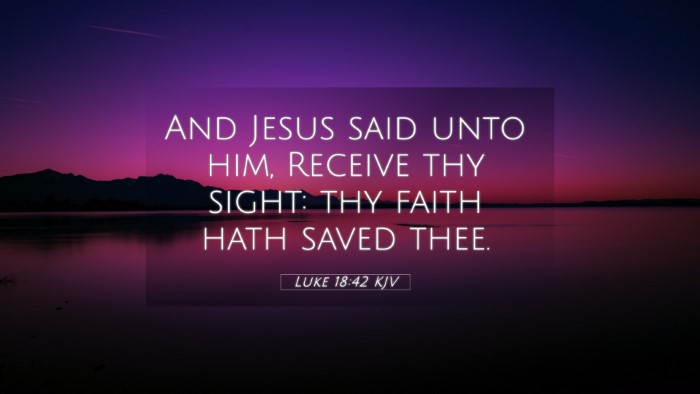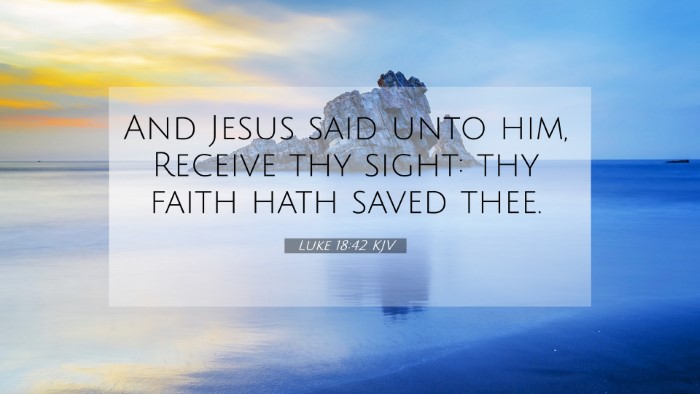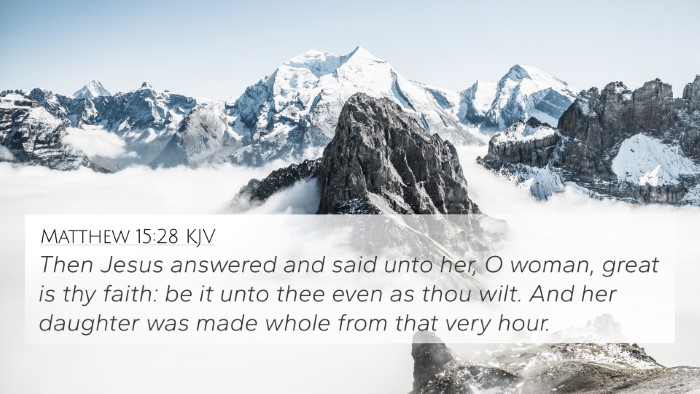Bible Verse Meaning: Luke 18:42
Verse Citation: Luke 18:42 - "And Jesus said unto him, Receive thy sight: thy faith hath saved thee."
Overview of Luke 18:42
This verse occurs in the narrative of Jesus healing a blind beggar in Jericho, illustrating both mercy and the power of faith. It signifies the transformative impact of faith, especially in instances of physical and spiritual healing.
Commentary Insights
Matthew Henry's Commentary
Henry emphasizes the importance of faith in this miracle. He notes that the blind man, though physically devoid of sight, displayed profound spiritual insight by recognizing Jesus as the Messiah. His request for mercy symbolizes a hunger for divine intervention that every believer experiences in their spiritual journey.
Albert Barnes' Commentary
Barnes reflects on the relationship between faith and healing, asserting that the man's faith was crucial to his recovery. This connection illustrates the biblical principle that faith can precede and result in miraculous works. He further discusses the significance of Jesus acknowledging the man's faith, showing that faith is not only a personal experience but also a communal revelation of God's grace.
Adam Clarke's Commentary
Clarke analyzes the social context, remarking on the societal disregard for the blind and the marginalized. Jesus’ interaction here demonstrates profound compassion and care, as He actively engages with the man, affirming his worth. Clarke also elaborates on the faith exhibited by the beggar, suggesting it as a model for all believers pursuing spiritual clarity and healing.
Key Takeaways
- Faith as a Catalyst: The healing illustrates how faith serves as the cornerstone of spiritual and physical restoration.
- Recognition of Jesus’ Authority: The blind man's acknowledgment of Jesus represents a deeper understanding required for redemption.
- Compassion in Action: Jesus’ response showcases the heart of ministry, which is to engage with and uplift those in need.
Bible Verse Cross-References
- Mark 10:52: "And Jesus said unto him, Go thy way; thy faith hath made thee whole." - A parallel account of healing the blind man.
- Matthew 9:22: "But Jesus turned him about, and when he saw her, he said, Daughter, be of good comfort; thy faith hath made thee whole." - Emphasizing faith's role in healing.
- John 9:38: "And he said, Lord, I believe. And he worshipped him." - The blind man’s faith leading to worship.
- Luke 17:19: "And he said unto him, Arise, go thy way: thy faith hath made thee whole." - Another affirmation of faith as integral to salvation.
- Hebrews 11:1: "Now faith is the substance of things hoped for, the evidence of things not seen." - A theological base for understanding faith.
- James 5:15: "And the prayer of faith shall save the sick, and the Lord shall raise him up..." - Highlighting faith’s connection to healing through prayer.
- Matthew 21:21: "Jesus answered and said unto them, Verily I say unto you, If ye have faith, and doubt not..." - Marking the power of unwavering faith.
Thematic Connections
Luke 18:42 not only stands alone but also resonates with numerous biblical themes such as redemption, faith, and compassion. By examining these themes, we can appreciate the holistic message of the Scriptures regarding healing—both spiritual and physical.
Importance of Cross-Referencing
Utilizing tools for Bible cross-referencing allows believers to see the interconnectedness of scriptural teachings. By understanding the relationships between various verses like those mentioned above, one can create a richer understanding of faith's role in salvation and healing.
Conclusion
In conclusion, Luke 18:42 serves as a vital verse that showcases the power of faith and the compassionate nature of Jesus. By referencing related scripture, believers gain deeper insights into their own faith journeys and the overarching narrative of God's love and healing.










